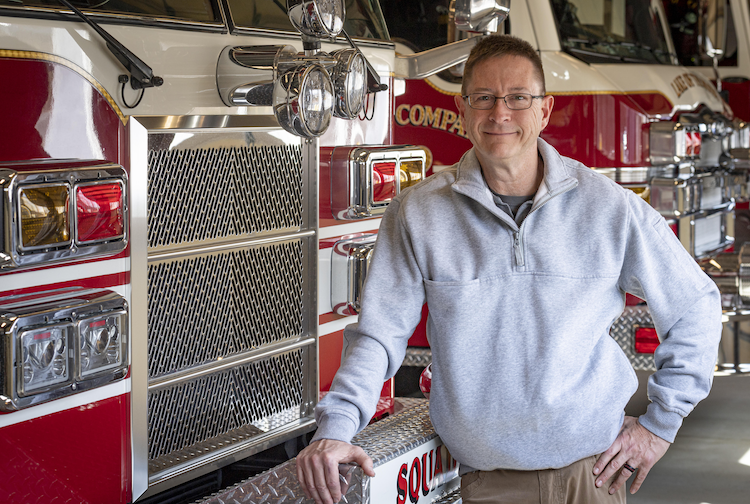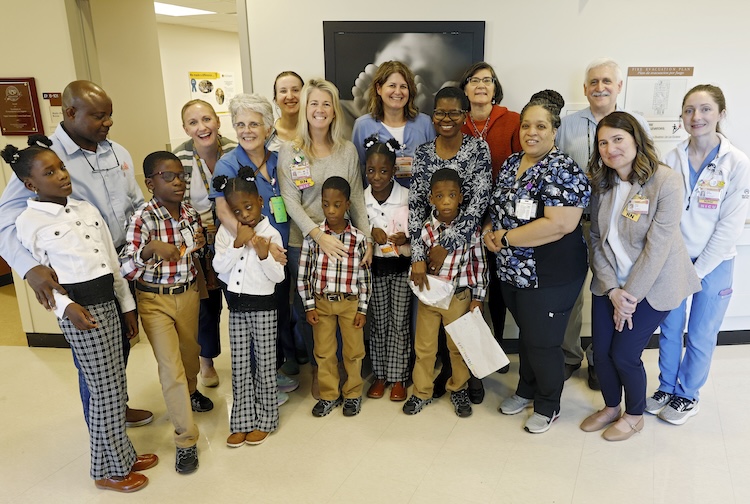Leading the pack with clinical compassion
With paw patrols spanning more than two decades, the Dogs on Call program at VCU Health continues to show the positive impact therapy dogs make on patients and health care workers.
October 07, 2025.JPG) Dogs on Call volunteer Margaret Popik and her dog Elsa often do rounds with patients at Children’s Hospital of Richmond at VCU and VCU Medical Center. (VCU Health Center for Human-Animal Interaction)
Dogs on Call volunteer Margaret Popik and her dog Elsa often do rounds with patients at Children’s Hospital of Richmond at VCU and VCU Medical Center. (VCU Health Center for Human-Animal Interaction)
By Joan Tupponce
Dogs on Call volunteer Margaret Popik and her dog Elsa were going about their normal rounds at Children’s Hospital of Richmond at VCU when the child life specialist asked if the duo could help with a tricky situation.
A child needed a throat swab. The child was clearly agitated and scared, kicking and squirming – trying to get away from the nurses and swab. But the tension in the room dissipated immediately as the child laid eyes on the Golden Doodle.
The child asked if Elsa could come on the bed for the throat swab and promised to lay still so Elsa wouldn’t be scared.
“We got a barrier sheet, had Elsa snuggle up on the bed next to the patient, and the child calmly opened their mouth and let the doctor perform the throat swab,” Popik said. “Elsa’s presence made the child feel calm, in control and comfortable in a situation that initially felt pretty tense and scary.”
Nancy Gee, Ph.D., director of the Center for Human-Animal Interaction at VCU Health, knows how important the hospital-based therapy dog visitation program is to patients, staff, visitors and students at Virginia Commonwealth University.
“In the last five years, we’ve delivered more than 300,000 meaningful interactions with people from VCU Health Community Memorial Hospital to VCU Health Tappahannock Hospital to the VCU Campus,” she said. “Dogs on Call is here to support all the people at VCU and VCU Health.”
Twenty-four years of puppy love
When Dogs on Call was created in 2001 by Sandra Barker, professor emeritus of psychiatry at VCU, it was one of the earliest hospital-based therapy dog programs in the nation.
The evidence-based program, housed in the department of psychiatry, was established to promote and provide a formal structure for research, clinical services and education related to the human-animal relationship. It is unique in a variety of ways:
- The program is based in a medical school, which is uncommon. They are often part of veterinary schools.
- It is globally recognized as a best practice program, leading the way as a model for other similar programs.
- Research conducted on the program, published in journals such as Innovation in Aging, Frontiers in Veterinary Science, Healthcare Research Journal and Journal of Ageing and Longevity, shows the scientific benefits of Dogs on Call interactions with patients and health care staff.
The program currently has 66 dog/handler teams with some people having more than one dog in the program. Last year, volunteers logged more than 1,700 hours, and delivered more than 4,700 visits to patients, staff, visitors and students across the university and academic health system. Visits can be requested by telling Dogs on Call staff the hospital, floor and room number.
VCU research shows the scientific benefits of therapy dog interactions with patients and health care staff. (VCU Health Center for Human-Animal Interaction)
“Hospitalized patients and the staff who care for them are frequently very stressed and that stress impacts their mood, reaction to new stressors and resilience,” Gee said. “For patients, this may increase the likelihood of negative health outcomes and for health care staff, it leads to burn out and compassion fatigue. Research is consistently showing, in a variety of populations, that interacting with a dog alleviates stress, elevates mood and has a number of positive health related outcomes.”
Gee has completed two grant-funded clinical trials at VCU Health that showed loneliness and anxiety were significantly reduced in older adults and adults who were hospitalized for the treatment of mental illness.
“All were admitted to the hospital for more than five days and all also showed improvement in mood following their interactions with our Dogs on Call dogs,” Gee said. “The dogs are fun and enjoyable, and they make people smile, but what they bring to the hospital is serious. They are having important positive effects on patients and staff psychological health outcomes.”
Elsa’s impact on patients is well documented. On one occasion, Popik and Elsa were visiting a patient with many doctors in the room.
“They asked if we could go to the patient’s left side and encourage them to pet Elsa,” she said.
Popik wasn’t sure if the patient could hear her, but she introduced Elsa and positioned her next to the patient’s hand.
“The patient’s hand was slow and shaking, but the patient began petting Elsa and the entire room erupted in cheers. Petting Elsa, which is a routine event for most of our visits, was a breakthrough for this patient, and it was a joy to witness,” Popik said.
It takes a village
Before entering the Dogs on Call program, dogs and their handlers have to meet certain requirements, such as external therapy dog registration (Pet Partners or Alliance of Therapy Dogs), as well as training with VCU Medical Center volunteer services and Dogs on Call.
Handlers are inspired to join the program for a variety of reasons, volunteering is associated with health benefits, doing something positive with their dogs. Popik felt called after her son’s best friend was diagnosed with cancer. The only thing that made him smile during the hospital stay, his parents told Popik, was a visit from a Dogs on Call dog.
“I knew that I wanted to try to become a therapy dog team with Elsa, and we started training classes right away,” she said.
The entire process took about a year, but Popik “was motivated and inspired by our neighbor who is now cancer free,” she said.
Now, whenever Popik slips the Dogs on Call vest on Elsa, the perky canine gets excited.
“She does a really cute squeal and waits by the door,” Popik said.
Many people — volunteers, staff and different department leaders along with the dogs themselves — contribute to the longevity of the program.
“I’d like to thank the hospital and university administration who have consistently endorsed and supported this program over the years,” Gee said. “Together we all provide consistent, safe, low-cost adjunctive therapy in support of all humans at VCU and VCU Health.”
With the continued accumulation of evidence detailing the benefits of interacting with dogs, Gee believes the future may hold a place for paid Dogs on Call handlers who consistently make rounds, allowing for doctors to place official orders for Dogs on Call visits for specific patient populations.
“We are making an important difference for people every day, and we need more human volunteers with their own dogs to help spread the tail wags and positive vibes throughout the health system,” Gee said, adding that she hopes people will consider becoming a Dogs on Call volunteer.
Popik considers it a privilege to provide this service to the care teams.
“If I had a magic wand, I would duplicate the Dogs on Call program for every hospital in existence,” she said.
Inspired by this story? Read more about our patients and providers


.JPG)


